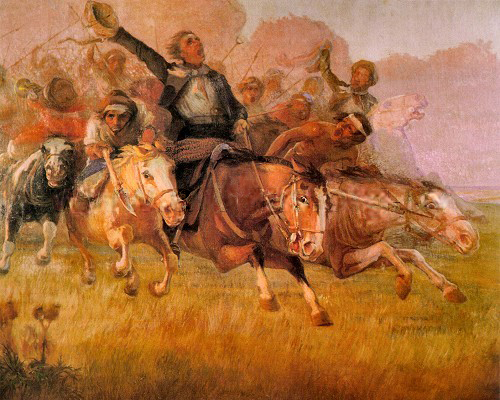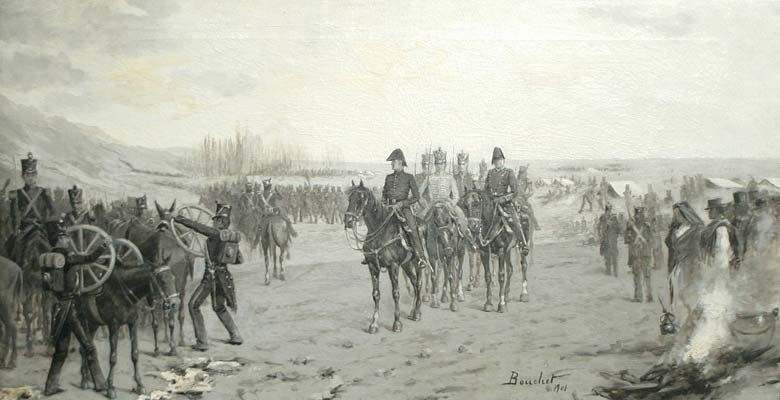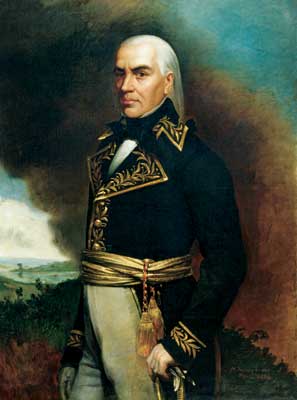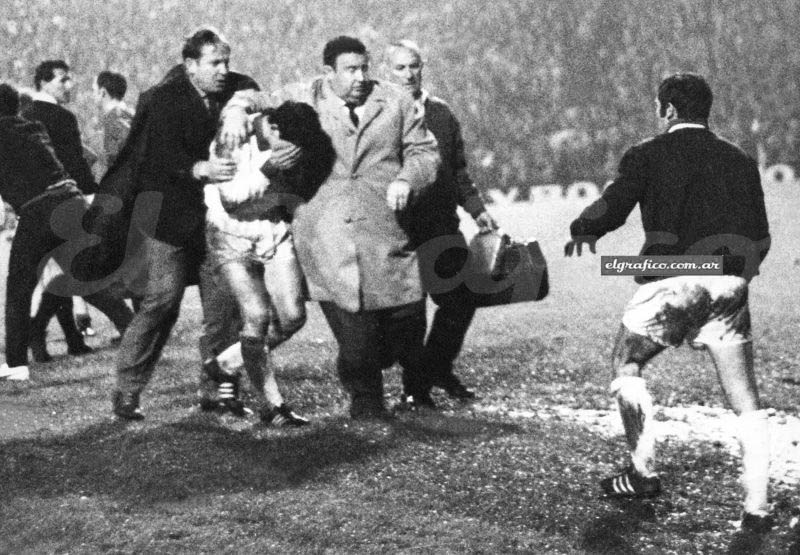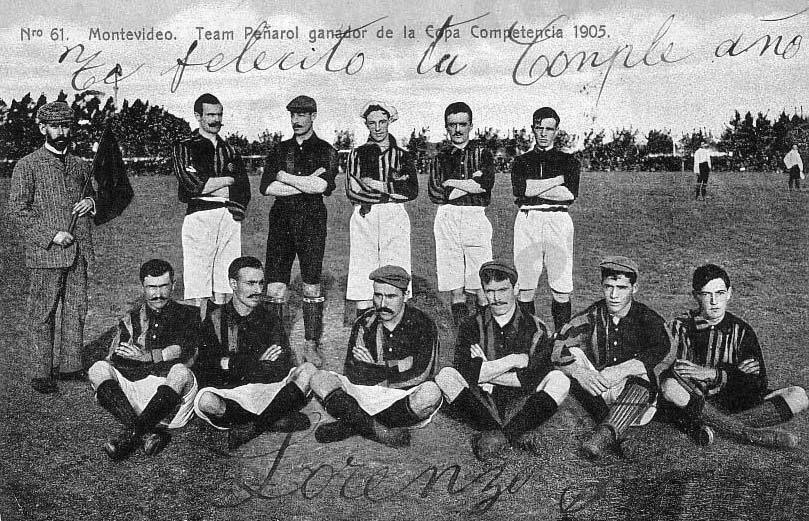|
Copa Libertadores
The CONMEBOL Libertadores, also known as Copa Libertadores de América (), is an annual continental club football competition organized by CONMEBOL since 1960. It is the highest level of competition in South American club football. The tournament is named after the '' Libertadores'' (Spanish and Portuguese for ''liberators''), the leaders of the Spanish American wars of independence and Brazilian Independence, so a literal translation of its former name into English is "''Liberators of America Cup''". The competition has had several formats over its lifetime. Initially, only the champions of the South American leagues participated. In 1966, the runners-up of the South American leagues began to join. In 1998, Mexican teams were invited to compete and contested regularly from 2000 until 2016. In 2000 the tournament was expanded from 20 to 32 teams. Today at least four clubs per country compete in the tournament, with Argentina and Brazil having the most representatives (six and ... [...More Info...] [...Related Items...] OR: [Wikipedia] [Google] [Baidu] |
CONMEBOL
CONMEBOL ( ) or CSF (; ; ), is the continental governing body of football in South America and it is one of FIFA's six continental confederations. The oldest continental confederation in the world, its headquarters are located in Luque, Paraguay. CONMEBOL is responsible for the organization and governance of South American football's major international tournaments. With 10 member football associations, it has the fewest members of all the confederations in FIFA. CONMEBOL national teams have won ten FIFA World Cups (Brazil five, Argentina three and Uruguay two) and CONMEBOL clubs have won 22 Intercontinental Cups and four FIFA Club World Cups. Argentina, Brazil and Uruguay have won two Olympic gold medals each. The World Cup qualifiers of CONMEBOL have been described as the "toughest qualifiers in the world" for their simple round-robin system, entry of some of the top national teams in the world, leveling of the weaker national teams, climate and geographic condition ... [...More Info...] [...Related Items...] OR: [Wikipedia] [Google] [Baidu] |
Santiago
Santiago (, ; ), also known as Santiago de Chile (), is the capital and largest city of Chile and one of the largest cities in the Americas. It is located in the country's central valley and is the center of the Santiago Metropolitan Region, which has a population of seven million, representing 40% of Chile's total population. Most of the city is situated between above sea level. Founded in 1541 by the Spanish conquistador Pedro de Valdivia, Santiago has served as the capital city of Chile since colonial times. The city features a downtown core characterized by 19th-century neoclassical architecture and winding side streets with a mix of Art Deco, Gothic Revival, and other styles. Santiago's cityscape is defined by several standalone hills and the fast-flowing Mapocho River, which is lined by parks such as Parque Bicentenario, Parque Forestal, and Parque de la Familia. The Andes Mountains are visible from most parts of the city and contribute to a smog problem ... [...More Info...] [...Related Items...] OR: [Wikipedia] [Google] [Baidu] |
José Gervasio Artigas
José Gervasio Artigas Arnal (; June 19, 1764 – September 23, 1850) was a soldier and statesman who is regarded as a national hero in Uruguay and the father of Uruguayan nationhood. Born in Montevideo, Artigas enlisted in the Spanish military in 1797 and fought the British in the Anglo-Spanish War (1796–1808), Anglo-Spanish War. At the outbreak of the Spanish American wars of independence, Spanish-American wars of independence, Artigas supported the Primera Junta in Buenos Aires against Spain. He defeated the Spanish royalists at Battle of Las Piedras (1811), Las Piedras and laid siege to Montevideo, but was forced to withdraw in the face of Portuguese invasion of the Banda Oriental (1811–1812), Portuguese intervention. Artigas subsequently broke with the United Provinces of the Río de la Plata, centralist government of Buenos Aires and took over Montevideo in 1815. He then oversaw the creation of the Federal League (1815–1820), Federal League, an alliance of six ... [...More Info...] [...Related Items...] OR: [Wikipedia] [Google] [Baidu] |
Bernardo O'Higgins
Bernardo O'Higgins Riquelme (; 20 August 1778 – 24 October 1842) was a Chilean independence leader who freed Chile from Spanish rule in the Chilean War of Independence. He was a wealthy landowner of Basque people, Basque-Spanish people, Spanish and Irish people, Irish ancestry. Although he was the second List of presidents of Chile, Supreme Director of Chile (1817–1823), he is considered one of Chile's founding fathers, as he was the first holder of this title to head a fully independent Chilean state. He was Captain general, Captain General of the Chilean Army, Brigadier general, Brigadier of the United Provinces of the Río de la Plata, General officer, General Officer of Gran Colombia and Grand Marshal of Peru. Early life Bernardo O'Higgins, a member of the O'Higgins family, was born in the Chilean city of Chillán in 1778, the Legitimacy (family law), illegitimate son of Ambrosio O'Higgins, 1st Marquis of Osorno, a Spanish officer born in County Sligo, Ireland, who be ... [...More Info...] [...Related Items...] OR: [Wikipedia] [Google] [Baidu] |
Pedro I Of Brazil
''Don (honorific), Dom'' Pedro I (12 October 1798 – 24 September 1834), known in Brazil and in Portugal as "the Liberator" () or "the Soldier King" () in Portugal, was the founder and List of monarchs of Brazil, first ruler of the Empire of Brazil from 1822 to 1831 (under the name of Pedro I) and List of Portuguese monarchs#House of Braganza (1640–1910), King of Portugal in 1826 (under the name of Pedro IV). Born in Lisbon, Pedro was the fourth child of King Dom John VI of Portugal and Queen Carlota Joaquina, and thus a member of the House of Braganza. When the country was Invasion of Portugal (1807), invaded by French troops in 1807, he and his family fled to Portugal's largest and wealthiest colony, Brazil. The outbreak of the Liberal Revolution of 1820 in Lisbon compelled Pedro I's father to return to Portugal in April 1821, leaving him to rule Brazil as regent. He had to deal with challenges from revolutionaries and insubordination by Portuguese troops, all of whi ... [...More Info...] [...Related Items...] OR: [Wikipedia] [Google] [Baidu] |
José De San Martín
José Francisco de San Martín y Matorras (; 25 February 177817 August 1850), nicknamed "the Liberator of Argentina, Chile and Peru", was an Argentine general and the primary leader of the southern and central parts of South America's successful struggle for independence from the Spanish Empire who served as the Protector of Peru. Born in Yapeyú, Corrientes, in modern-day Argentina, he left the Viceroyalty of the Río de la Plata at the early age of seven to study in Málaga, Spain. In 1808, after taking part in the Peninsular War against France, San Martín contacted South American supporters of independence from Spain in London. In 1812, he set sail for Buenos Aires and offered his services to the United Provinces of the Río de la Plata, present-day Argentina and other countries. After the Battle of San Lorenzo and time commanding the Army of the North during 1814, he organized a plan to defeat the Spanish forces that menaced the United Provinces from the north, us ... [...More Info...] [...Related Items...] OR: [Wikipedia] [Google] [Baidu] |
Simón Bolívar
Simón José Antonio de la Santísima Trinidad Bolívar y Palacios (24July 178317December 1830) was a Venezuelan statesman and military officer who led what are currently the countries of Colombia, Venezuela, Ecuador, Peru, Panama, and Bolivia to independence from the Spanish Empire. He is known colloquially as ''El Libertador'', or the ''Liberator of America''. Simón Bolívar was born in Caracas in the Captaincy General of Venezuela into a wealthy family of American-born Spaniards (Criollo people, criollo) but lost both parents as a child. Bolívar was educated abroad and lived in Spain, as was common for men of upper-class families in his day. While living in Madrid from 1800 to 1802, he was introduced to Enlightenment philosophy and married María Teresa Rodríguez del Toro y Alaysa, who died in Venezuela from yellow fever in 1803. From 1803 to 1805, Bolívar embarked on a Grand Tour that ended in Rome, where he swore to end the Spanish America, Spanish rule in the Amer ... [...More Info...] [...Related Items...] OR: [Wikipedia] [Google] [Baidu] |
Buenos Aires
Buenos Aires, controlled by the government of the Autonomous City of Buenos Aires, is the Capital city, capital and largest city of Argentina. It is located on the southwest of the Río de la Plata. Buenos Aires is classified as an Alpha− global city, according to the Globalization and World Cities Research Network, GaWC 2024 ranking. The city proper has a population of 3.1 million and its urban area 16.7 million, making it the List of metropolitan areas, twentieth largest metropolitan area in the world. It is known for its preserved eclecticism, eclectic European #Architecture, architecture and rich culture, cultural life. It is a multiculturalism, multicultural city that is home to multiple ethnic and religious groups, contributing to its culture as well as to the dialect spoken in the city and in some other parts of the country. This is because since the 19th century, the city, and the country in general, has been a major recipient of millions of Immigration to Argentina, im ... [...More Info...] [...Related Items...] OR: [Wikipedia] [Google] [Baidu] |
Intercontinental Cup (1960–2004)
The Intercontinental Cup, officially the European/South American Cup and known from 1980 as the Toyota Cup for sponsorship reasons, was an international association football, football competition endorsed by UEFA (Europe) and CONMEBOL (South America), contested between representative clubs from these confederations, usually the winners of the UEFA Champions League and the South American Copa Libertadores. It ran from 1960 to 2004, when it was succeeded by the FIFA Club World Cup, although they both ran concurrently in 2000. From its formation in 1960 to 1979, the competition was as a two-legged tie, with a play-off if necessary until 1968, and Penalty kick (association football), penalty kicks later. During the 1970s, European participation in the Intercontinental Cup became a running question due to controversial events in the 1969 Intercontinental Cup, 1969 match, and some European Cup-winning teams withdrew.Risolo, Don (2010)Soccer Stories: Anecdotes, Oddities, Lore, and Ama ... [...More Info...] [...Related Items...] OR: [Wikipedia] [Google] [Baidu] |
UEFA
The Union of European Football Associations (UEFA ; ; ) is one of six continental bodies of governance in association football. It governs football, futsal and beach soccer, beach football in Europe and the List of transcontinental countries#Asia and Europe, transcontinental countries of Turkey, Azerbaijan, Georgia and Kazakhstan, as well as the West Asian countries of Cyprus, Armenia and Israel. UEFA consists of 55 national association List of men's national association football teams#UEFA (Europe), members. Since 2022, due to the Russian invasion of Ukraine, FIFA and UEFA suspended all Russian national teams and clubs from any FIFA and UEFA competitions. UEFA consists of the national football associations of Europe, and runs national and club competitions including the UEFA European Championship, European Championship, UEFA Nations League, Nations League, UEFA Champions League, Champions League, UEFA Europa League, Europa League, UEFA Conference League, Conference League, and ... [...More Info...] [...Related Items...] OR: [Wikipedia] [Google] [Baidu] |
João Havelange
Jean-Marie Faustin Godefroid "João" de Havelange (, ; 8 May 1916 – 16 August 2016) was a Brazilian lawyer, businessman, and athlete who was the seventh president of FIFA from 1974 to 1998. His tenure as president is the second longest in FIFA's history, behind that of Jules Rimet. He received the title of honorary president when leaving office, but resigned in April 2013. He was preceded by Stanley Rous and succeeded by Sepp Blatter. Havelange served as a member of the International Olympic Committee (IOC) from 1963 to 2011. He was the longest-serving active member upon his resignation. In July 2012, a Swiss prosecutor's report revealed that, during his tenure on FIFA's Executive Committee, he and his son-in-law Ricardo Teixeira took more than 41 million Swiss francs (£21m) in bribes in connection with the award of World Cup marketing rights. Early life, professional and Olympic career Havelange was born on 8 May 1916, in Rio de Janeiro, to an affluent family coming ... [...More Info...] [...Related Items...] OR: [Wikipedia] [Google] [Baidu] |
Peñarol
Club Atlético Peñarol (), more commonly referred to as Peñarol, is a Uruguayan professional football club based in Montevideo. The club currently competes in the Uruguayan Primera División, the highest tier in Uruguayan football. The name of the club comes from the neighborhood on the outskirts of Montevideo, which itself takes its name from Pinerolo, a town in the metropolitan area of Turin, in the Italian region of Piedmont. The club's origin dates back to the 28th of September 1891, when the club was initially established as the Central Uruguay Railway Cricket Club (also known by its acronym CURCC), founded by mostly British railway workers for the practise of cricket. The club was renamed as Peñarol on 13 December 1913; the continuity between the football section of the CURCC and Peñarol has sparked significant controversy in Uruguayan football, as some football pundits have argued that while Peñarol inherited its tradition from the CURCC and there is a sociolog ... [...More Info...] [...Related Items...] OR: [Wikipedia] [Google] [Baidu] |


